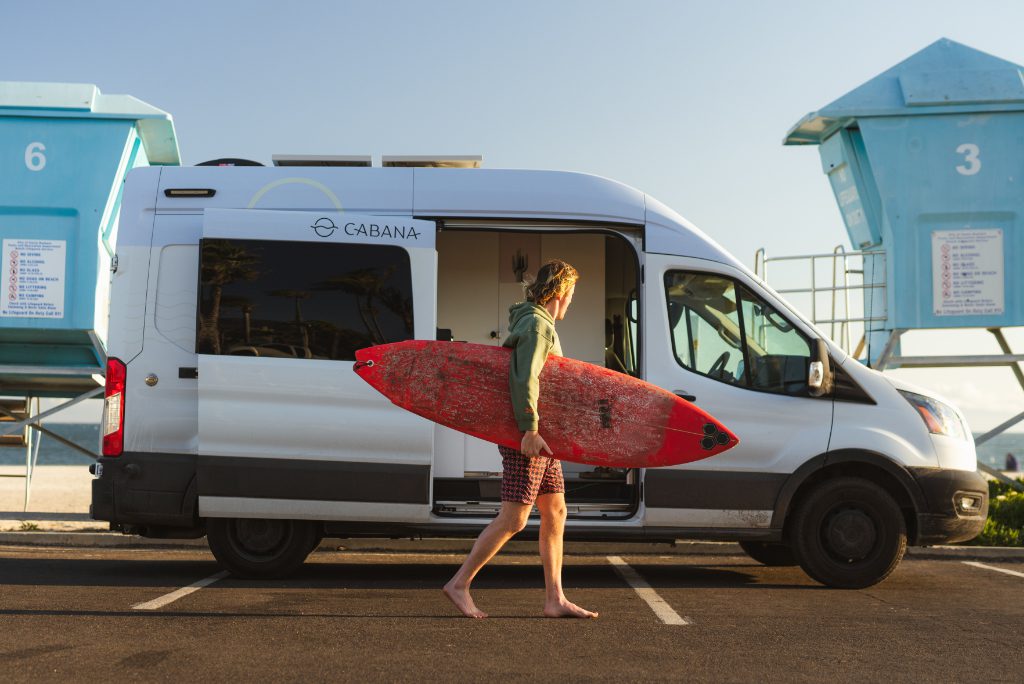Skift Take
New startup Cabana is betting that the outdoor adventure sector can at least double in size with better product and service. It's interesting that Jason Calacanis and Paul English are backers because they've used this playbook before as entrepreneurs and investors in other sectors.
Cabana, a mobile hotel startup (think: glamping on wheels), said on Tuesday it had raised $10 million, which may seem like a small amount but is further evidence of investor intrigue in new ideas for outdoor travel.
Craft Ventures and Goldcrest Capital led the Series A round. Danish venture capital firm Nordic Eye also participated.
Cabana, based in Seattle, previously raised $3.5 million in seed funding. Its investors include Jason Calacanis, who is both a serial entrepreneur who created Silicon Alley Reporter and Weblogs Inc., and a serial early-stage investor in companies such as Uber, and Paul English, the co-founder of the travel search engine Kayak and the business travel startup Lola.
“We’ll use the funds to build our technology platform, continue improving our vehicle design, and expand to a four-passenger van from the current model,” said Cabana co-founder and CEO Scott Kubly.
Cabana designs campervans that it rents. It designs the vehicles to avoid problems that inexperienced RV renters hate — striving to blend hotel-like amenities with the convenience of car sharing. The company uses software to smooth out planning and logistical matters for travelers, too.
A Boom of Interest in RVs and Campervans
The startup is riding a wave of interest in the outdoor travel sector, especially in RV rentals. Social media has popularized the trend with the hashtag #vanlife, and the pandemic gave a boost to the trend as people spent more time outdoors and away from crowds domestically.
The buzz has helped Cabana, which is an assertive user of Instagram marketing. About 95 percent of its bookings come directly to its website and mobile app, Kubly said. The company puts its branding on its vehicles, which helps with word-of-mouth, too.
Yet despite the booming interest in RVs, some skeptics have questioned if the premium segment of the camper van rental vacation market has room to scale.
Kubly, a former top executive at the electric scooter-sharing service Lime, believes that the better analogy for Cabana is Uber — which widened the market of total revenue first created by traditional taxis by making it much easier to hail a ride.
Only one out of 200 Americans have rented an RV, according to one estimate. So a simpler system could tap demand from people who have been too intimidated to try camper vans until now, according to Kubly. Since the company’s founding in 2019, about 70 percent of Cabana’s customers have been first-time camper van renters or users, and another 27 percent have used an RV once or twice.
“We’re putting a comfortable bed wherever you want it, which could be at a trailhead, or a pop-up music festival, or a corporate team-building event,” Kubly said. “If hotels have no vacancies left during a major event like a Big Ten basketball game or the Super Bowl, you could park nearby in an RV. We can add lodging supply to any location flexibly and dynamically. That makes us a much bigger opportunity.”
Growth Spurt
Cabana has served only a few U.S. markets, controlling the hardware, customer service, sales, and marketing.
The company has tackled common pain points. For example, it made the kitchen in its custom vans modular, which lets its team swap out kitchen units for cleaning in-between rentals. The company also designed its vans with space for baggage, and it splurged on the bathroom, which is often a turn-off for new renters using traditional vehicles.
The company has also tried to simplify trip planning. Renters fill out a five-minute questionnaire online, and the company proposes an itinerary to follow.
In the past year, the company has reportedly operated 25 vehicles with an average 75 percent occupancy and approximately 28 percent net margins.
Over time, Kubly and his co-founder Jonathan Savage want to move the business to something closer to a franchise model, where it finds local owner-operators to help it scale.
Outdoor Travel’s Big Moment
Cabana faces some modest competition from players with overlapping services.
Perhaps the largest one is AutoCamp, a startup that raised $115 million in 2019, and that has been offering upscale trailer resorts in a handful of U.S. locations, such as in California’s Russian River Valley and Yosemite National Park.
AutoCamp guests stay in Airstreams or luxury tents, and the startup handles the details, such as supplying bed sheets with high thread counts. The resort area’s public bathrooms typically are more hotel-like than camp-like, for instance.
Investors have also poured money into other outdoor adventure and recreation companies. Earlier this year, Outdoorsy, a peer-to-peer marketplace for renting RVs, closed an unpublicized follow-on round after raising $50 million in 2019.
In March, Harvest Hosts, a membership program for recreational vehicle, or RV, owners in North America, raised $37 million from private equity investor Stripes. Last year, RVshare, a rental marketplace for recreational vehicles, raised more than $100 million in a round led by KKR.
Kubly unsurprisingly said those marketplaces aren’t true competitors.
“Renting an RV or campervan is a fringe activity for many people because it’s so complicated,” Kubly said. “If you look at some of the peer-to-peer marketplaces, you see variability in the quality of the supply, which can be frustrating to consumers.”
Kubly unsurprisingly argued that there are hurdles to other entrepreneurs coming in and directly competing. He said the totality of the components Cabana is building, such as vehicle design, fleet financing, and operational efficiency, all require strong execution that creates a moat buffering the company from new entrants.
One possible headwind, though, is a backlash to the “gentrification” of the RV and campervan segment by middle-class and upper-middle-class people. The trend has caused some clashes with long-time RV users who have rented or owned RVs for vacation for years. The die-hards often roll their eyes at the newbies.
But Kubly said the two segments are different and can be marketed to and served differently.
“We’re not a camper company,” Kubly said. “We’re a travel experience company.”
The Daily Newsletter
Our daily coverage of the global travel industry. Written by editors and analysts from across Skift’s brands.
Have a confidential tip for Skift? Get in touch
Tags: funding, outdoor travel, outdoors, RVs, startups
Photo credit: One of Cabana's recreational vehicles. The travel startup based in Seattle has raised $10 million in funding for hotel-style recreational vehicle, or RV, rentals. Cabana

